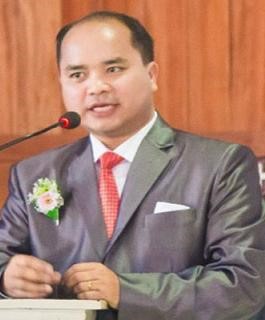
Nehginpao Kipgen (25.5.1978–2.5.2021) was a Professor and Executive Director of the Center for Southeast Asian Studies (CSEAS) at the Jindal School of International Affairs, O.P.Jindal Global University. He was a renowned Political Scientist and thinker whose concentrations were in Comparative Politics and International Relations. His general teaching and research interests included Democratization, Global/World Politics, Ethnic Conflict and Identity Politics, Human Rights, Refugees, Maritime Disputes, International Organizations, and Government and Politics of Southeast Asia.
His scholarly work was focussed on Asia, with a specialization in Southeast Asia and Burma/Myanmar. He had presented papers and served as a chair and discussant in several international academic conferences, including International Political Science Association (IPSA) and International Studies Association (ISA). He was also a Board Member (RC18 – Asian and Pacific Studies) of IPSA.
Since 2013, Professor Kipgen had served as a “country expert for Burma/Myanmar” for Varieties of Democracy (V-Dem), a collaborative academic research project of the Department of Political Science, University of Gothenburg (Sweden), and the Kellogg Institute, University of Notre Dame (USA). Professor Kipgen was awarded scholarships by Open Society Institute, New York; Prospect Burma, London; and the U.S. State Department for his Masters and Doctoral programmes. He was also a recipient of the International Writing Award from Earth Community Organization, Canada.
Professor Kipgen published four single-authored books by Routledge (Taylor & Francis), Oxford University Press, and Ruby Press; 24 peer-reviewed academic articles in Asian Journal of Social Science, Social Research, International Studies, World Affairs, Journal of Asian and African Studies, Journal of Muslim Minority Affairs, Ethnopolitics, Strategic Analysis, South Asia Research, Indian Journal of Political Science, Economic and Political Weekly, Asian Profile, Asian Affairs, International Journal on World Peace, and India Review. He also had over 230 publications in various leading international newspapers and magazines across five continents – Asia, Africa, Australia, Europe, and North America. These included, among others: Washington Post, Washington Times, Foreign Policy Journal, Fair Observer, Huffington Post, The World Post, International Peace Institute/Global Observatory, Nikkei Asian Review, The Diplomat, The Japan Times, The Straits Times, TODAY, Channel NewsAsia, The Star, New Straits Times, The Guardian, Epoch Times, Jerusalem Post, The Hindu, Hindustan Times, Asian Age, Deccan Chronicle, The Statesman, Sydney Morning Herald, The Age, New Zealand Herald, National Times, Asia Times, China Post, China Daily, Global Times, Japan Today, Korea Times, South China Morning Post, Ming Pao, The Indian Express, The Pioneer, The Telegraph, The Wire, Journal of Turkish Weekly, Al Jazeera, The National, The Standard, Bangkok Post, Jakarta Post, Jakarta Globe, Manila Times, Brunei Times, Gulf Times, Gulf Today, Khaleej Times, Arab News, Phnom Penh Post, Global New Light of Myanmar, Myanmar Times, Malaysian Mirror, Bangladesh Today, The Daily Star, The Island, Asia Sentinel, Asia News Network, Asian Tribune, Institute of Peace and Conflict Studies, and The Irrawaddy.
Professor Kipgen was often invited to comment on political developments in Myanmar and other ASEAN countries by the British Broadcasting Corporation (BBC), Radio Free Asia (RFA), Voice of America (VOA), ABC Radio National (Australia), Channel NewsAsia (Singapore), and India-based Lok Sabha TV, DD India, WION television, Beijing-based China Global Television Network (CGTN), ANC television (Philippines), and Sputnik International (Russia).
Professor Kipgen straddled the worlds of academia and activism. He was a prominent voice for democracy and human rights in his native Myanmar, and a proponent of nonviolent change to the authoritarian status quo in Southeast Asia. He was a member of the Kuki ethnic group in Myanmar that had suffered immensely under military dictatorship for over half a century. He had kinfolk in Manipur, on the Indian side of the border as well, and was considered i a shining example of someone coming from a downtrodden and oppressed community who got a PhD degree, studied in the USA, and was a top professor who was much sought after for his views in the national and international media about developments in Southeast Asia.
Professor Kipgen was also a fine teacher who trained hundreds of JSIA students for several years. One of his unique attributes was co-publishing with JSIA students in scholarly and popular news media. He served on numerous internal committees of JSIA and helped build the institution. He was also Assistant Dean for International Collaborations and helped students with study abroad opportunities. His commitment and passion to academia were extraordinary.
JSIA salutes a giant in Southeast Asian studies and will never forget his remarkable contributions and legacy.